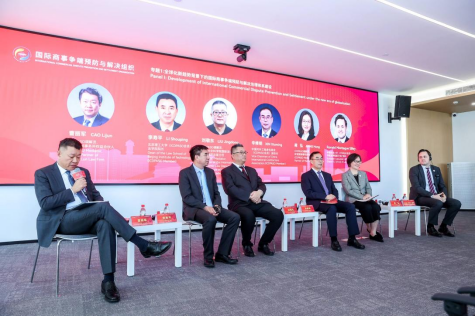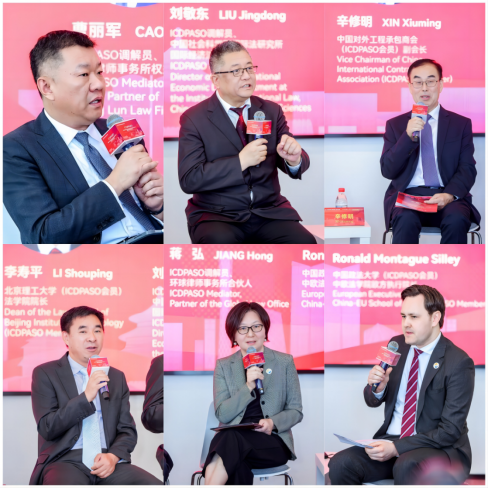Overview of the Symposium Module I of the ICDPASO High-Level Dialogue
Time:2025/04/28 BJT
Beijing April 15, 2025 - The International Commercial Dispute Prevention and Settlement Organization (ICDPASO) held the ICDPASO High-Level Dialogue in Beijing. In the Symposium Module I, Topic "The Development of International Commercial Dispute Prevention and Settlement under the New Era of Globalization", several legal experts from universities, enterprises, dispute settlement institutions and associations were invited to participate in sharing and exchanges. CAO Lijun, ICDPASO Mediator and Equity Partner of Zhong Lun Law Firm, presided over this Module.

LIU Jingdong, ICDPASO Mediator and Director of the International Economic Law Department at the Institute of International Law of the Chinese Academy of Social Sciences, pointed out that based on the current newly revised The Law of the People's Republic of China on Foreign State Immunity and the trend of amending the Arbitration Law, if China can revoke the "commercial reservation" to the New York Convention and designate the courts as the recognising and enforcing body to the Secretariat or Depository of the Washington Convention, it will, to a certain extent, weaken the restrictions on the enforcement of investment arbitration awards, including ICSID and Non-ICSID awards. ICDPASO could carry out characteristic dispute prevention work in international investment, provide guidance and compliance training for business entities, and provide advance services to enterprises.
XIN Xiuming, Vice Chairman of the China International Contractors Association, stated that in the field of international engineering construction, the number of disputes regarding project schedules and claims for design change compensation is relatively large, and the subject matter amount is relatively high. Most of these disputes are resolved through international arbitration. However, the long arbitration cycle and high costs are prominent issues reported by enterprises, which tend to resolve the corresponding disputes through mediation. It is hoped that the ICDPASO will play a greater role, participate in the formulation of international rules, design and promote international engineering contract templates that are suitable for the characteristics of Chinese enterprises, and provide more efficient and low-cost dispute resolution services for Chinese enterprises.
LI Shouping, Dean of the Law School of Beijing Institute of Technology, considered that in the future, artificial intelligence can be applied to various aspects of arbitration, including case-filing, collation of court hearing records, analysis of the key points of disputes, issuance of arbitration awards, and so on. The development of artificial intelligence will prompt reform in arbitration rules. The ICDPASO should focus on rule innovation, proactively address the challenges brought about by artificial intelligence in advance, and lead the transformation of international arbitration rules.
JIANG Hong, lCDPASO Mediator and Partner of the Global Law Office, pointed out that enterprises need to clarify the tariff payers and withholding agent, reasonably select Trade Terms, refine and improve the setting of contract clauses, and reduce transaction costs by adjusting the supply chain and changing the determination of the origin of goods. Meanwhile, enterprises should also conduct self-inspections of their goods, reasonably apply the tariff exclusion process, and strengthen the compliance management of goods categories, origin rules, and customs rules to cope with the increasingly complex overall trend of the current international trade environment.
Ronald Montague Silley, European Executive Co-Dean of the China-EU School of Law of China University of Political Science and Law, stated that ESG disputes involve not only business aspects but also public interests. Arbitrators need to have a broad understanding of interdisciplinary knowledge such as soft law, international standards, environmental science, and greenhouse gas emissions. At the same time, Chinese enterprises need to be aware that ESG obligations have become a necessity. If they develop business in Europe, they need to follow relevant ESG governance rules, and should not solely rely on investor rights protection agreements. Merchant commercial person need to consider ESG requirements, embed the ESG concept into the strategic development and corporate culture of the enterprise, prepare in advance for public audits, and abide by global frameworks and the development principles of the United Nations and the OECD.


